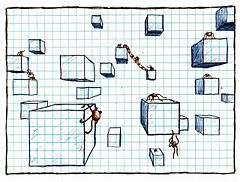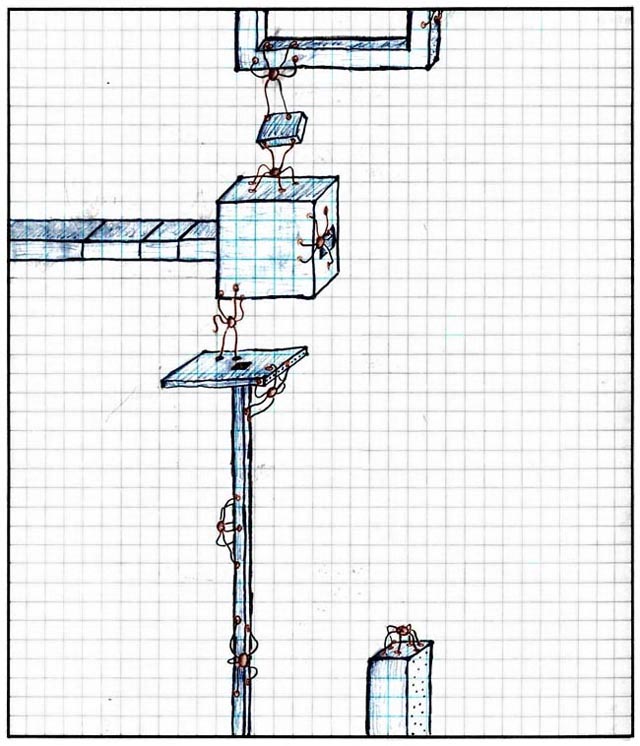Collective phenomena in economy and society: Difference between revisions
(Society) |
(Overall) |
||
| Line 28: | Line 28: | ||
<!-- END OF INFOBOX --> | <!-- END OF INFOBOX --> | ||
Also known as mass action, collective behavior, and artificial chemistry | Also known as mass action, collective behavior, and artificial chemistry. Strong interactions such as those in macroscopic systems frequently induce transitions and lead to new equilibrium phases of matter. These phases exhibit their own chqaracteristic fluctuations or elementary excitations known as collective modes. Although a description of these phenomena at the microscopic level can be quite complicated, the important large scale, or longtime hydrodynamic behavior is often is often simple to describe. | ||
Phenomenal approaches based on this concept have led to certain quantum as well as classical field theories that over recent years have played a major role in shaping our understanding of condensed matter and high energy physics. | |||
Our goal is to develop a framework in which to describe critical properties associated with classical and quantum phase transitions; and at the same time to emphasize the importance and role played by symmetry and topography. | |||
==Physics== | ==Physics== | ||
* Solitons | * Solitons | ||
| Line 43: | Line 47: | ||
Society shows sometimes abrupt changes - revolutions - which are related to phase transitions: both are sudden and dramatic changes of behavior. | Society shows sometimes abrupt changes - revolutions - which are related to phase transitions: both are sudden and dramatic changes of behavior. | ||
Social systems are prominent examples of complex systems. Concepts, tools and models aiming at identifying generic mechanisms underlying collective phenomena in these systems are developed with the use of Game Theory | Social systems are prominent examples of complex systems. Concepts, tools and models aiming at identifying generic mechanisms underlying collective phenomena in these systems are developed with the use of | ||
===Game Theory=== | |||
===Statistical Physics, Agent Based Models and Complex Networks Theory. Cooperation, cultural conflicts and problems of social consensus are examples of phenomena being addressed. | |||
==Other Examples== | ==Other Examples== | ||
Revision as of 23:22, 21 April 2009
“ Ah, the reason we all majored in physics in the first place... ”
| ||||||||||
Also known as mass action, collective behavior, and artificial chemistry. Strong interactions such as those in macroscopic systems frequently induce transitions and lead to new equilibrium phases of matter. These phases exhibit their own chqaracteristic fluctuations or elementary excitations known as collective modes. Although a description of these phenomena at the microscopic level can be quite complicated, the important large scale, or longtime hydrodynamic behavior is often is often simple to describe.
Phenomenal approaches based on this concept have led to certain quantum as well as classical field theories that over recent years have played a major role in shaping our understanding of condensed matter and high energy physics.
Our goal is to develop a framework in which to describe critical properties associated with classical and quantum phase transitions; and at the same time to emphasize the importance and role played by symmetry and topography.
Physics
- Solitons
- Perturbation theory in quantum mechanics
- Ising Model
- The quantization of magnetic flux in a superconductor
- quantum Hall effect are both collective phenomena associated with thermodynamically large numbers of particles.
Economy
the formation of nations, languages and religions show similarities to condensation of vapor into liquid droplets
Society
Society shows sometimes abrupt changes - revolutions - which are related to phase transitions: both are sudden and dramatic changes of behavior.
Social systems are prominent examples of complex systems. Concepts, tools and models aiming at identifying generic mechanisms underlying collective phenomena in these systems are developed with the use of
Game Theory
===Statistical Physics, Agent Based Models and Complex Networks Theory. Cooperation, cultural conflicts and problems of social consensus are examples of phenomena being addressed.
Other Examples
Animal Magnetism, like Herding
References
- http://www.santafe.edu/research/topics-dynamics-human-behavior-institutions.php
- Soft Condensed Matter, by Richard A. L. Jones (Oxford University Press, 2007).
- Solid State Physics, by J. R. Hook and H. E. Hall (Wiley, 2007).
- http://www.tcm.phy.cam.ac.uk/~bds10/phase.html

